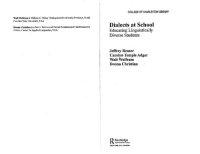
Ebook: Dialects at School: Educating Lingusitically Diverse Students
Like its predecessor, Dialects in Schools and Communities, this book illuminates major language-related issues that educational practitioners confront, such as responding to dialect related features in students’ speech and writing, teaching Standard English, teaching students about dialects, and distinguishing dialect difference from language disorders. It approaches these issues from a practical perspective rooted in sociolinguistic research, with a focus on the research base for accommodating dialect differences in schools. Expanded coverage includes research on teaching and learning and attention to English language learners.
All chapters include essential information about language variation, language attitudes, and principles of handling dialect differences in schools; classroom-based samples illustrating the application of these principles; and an annotated resources list for further reading. The text is supported by a Companion Website (www.routledge.com/cw/Reaser) providing additional resources including activities, discussion questions, and audio/visual enhancements that illustrate important information and/or pedagogical approaches.
Comprehensive and authoritative, Dialects at School reflects both the relevant research bases in linguistics and education and educational practices concerning language variation. The problems and examples included are authentic, coming from the authors’ own research, observations and interactions in public school classrooms, and feedback in workshops. Highlights include chapters on oral language and reading and writing in dialectally diverse classrooms, as well as a chapter on language awareness for students, offering a clear and compelling overview of how teachers can inspire students to learn more about language variation, including their own community language patterns. An inventory of dialect features in the Appendix organizes and expands on the structural descriptions presented in the chapters.
All chapters include essential information about language variation, language attitudes, and principles of handling dialect differences in schools; classroom-based samples illustrating the application of these principles; and an annotated resources list for further reading. The text is supported by a Companion Website (www.routledge.com/cw/Reaser) providing additional resources including activities, discussion questions, and audio/visual enhancements that illustrate important information and/or pedagogical approaches.
Comprehensive and authoritative, Dialects at School reflects both the relevant research bases in linguistics and education and educational practices concerning language variation. The problems and examples included are authentic, coming from the authors’ own research, observations and interactions in public school classrooms, and feedback in workshops. Highlights include chapters on oral language and reading and writing in dialectally diverse classrooms, as well as a chapter on language awareness for students, offering a clear and compelling overview of how teachers can inspire students to learn more about language variation, including their own community language patterns. An inventory of dialect features in the Appendix organizes and expands on the structural descriptions presented in the chapters.
Download the book Dialects at School: Educating Lingusitically Diverse Students for free or read online
Continue reading on any device:

Last viewed books
Related books
{related-news}
Comments (0)